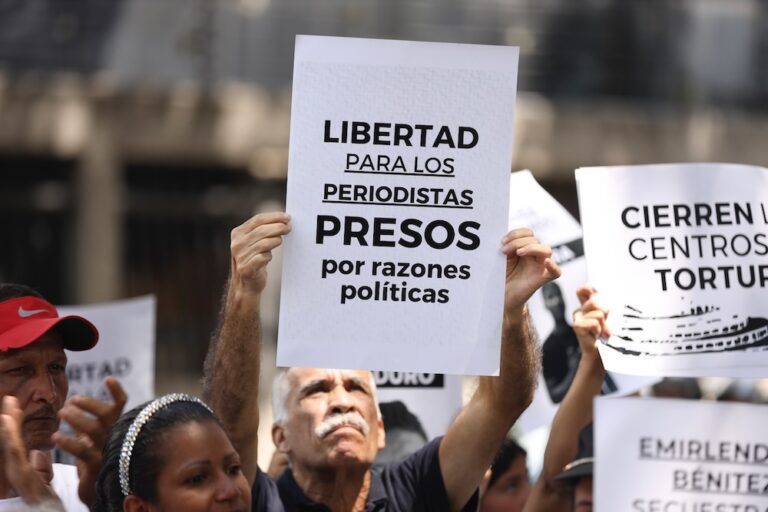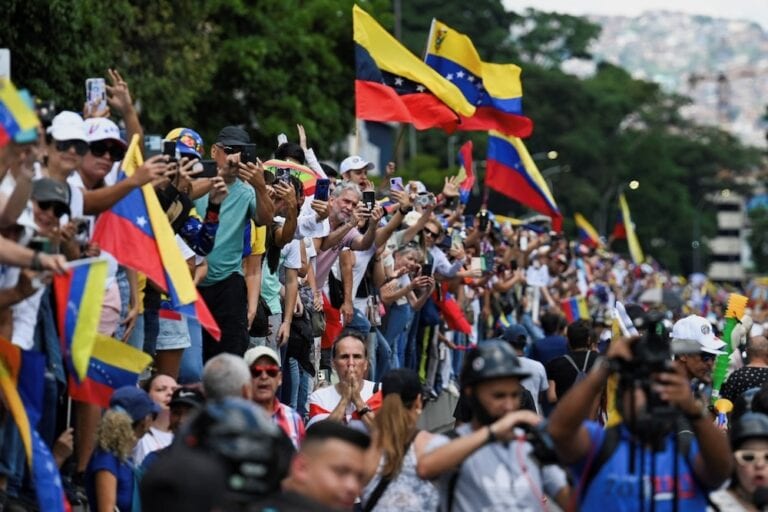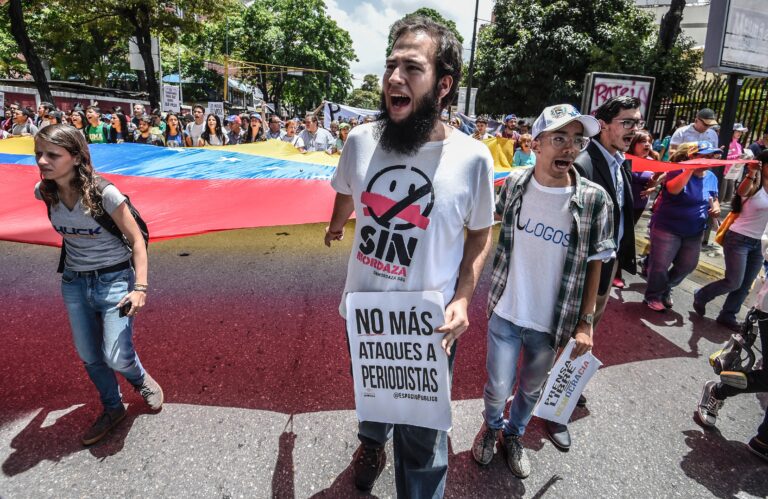(IAPA/IFEX) – The following is a 25 February 2002 IAPA press release: IAPA blames Chávez for lack of press freedom in Venezuela MIAMI, Florida (February 25, 2002)-The Inter American Press Association (IAPA) has found Venezuelan President Hugo Chávez to be “the person responsible” for the lack of press freedom in his country. This follows a […]
(IAPA/IFEX) – The following is a 25 February 2002 IAPA press release:
IAPA blames Chávez for lack of press freedom in Venezuela
MIAMI, Florida (February 25, 2002)-The Inter American Press Association (IAPA) has found Venezuelan President Hugo Chávez to be “the person responsible” for the lack of press freedom in his country. This follows a three-day visit to the country by a high-level IAPA delegation to look into complaints of a growing wave of violence against journalists and news media executives.
In its report on the visit, the delegation, led by IAPA President Robert J. Cox, expressed “utmost concern and alarm at the physical violence and verbal aggression unleashed by pro-government groups and instigated by the executive branch.” It added that “President Chávez must assume responsibility for these violent acts and will also have to answer for any escalation into even more serious actions against journalists and news media executives, which Venezuelans fear may happen.”
The delegation also noted that violence is not the only form of attack on press freedom, saying that there is clear judicial harassment of news media that are critical of the government, and there are a number of legislators who demonstrate their submission to those in power by seeking to promote the introduction of laws and mechanisms to regulate the press. Among such proposed legislation, the IAPA warned, is a bill for a Law on Content, which together with the constitutional provision on the requirement to report only “truthful information” could be used to censor the media and individual journalists. Also seen as a threat is a call on media executives to draw up a code of ethics.
Cox, associate editor of The Post and Courier newspaper, in Charleston, South Carolina, said that “Chávez is the person responsible in that he is at the head of a wave of intolerance that truly reflects his anti-free speech policies, through which he seeks to intimidate those who criticize the actions of his administration.” He added that there is a strategy being conducted by the administration, with the adhesion of members of other branches of government, that amounts to “an excessive and disgraceful stance that is putting democracy in Venezuela at risk.”
During its three-day visit, which wound up on Friday, the IAPA delegation met with members of Congress, prosecutors, leaders of the Catholic Church, and representatives of international organizations, the Press Union and the National Guild (Colegio) of Journalists. Following the meetings, the IAPA expressed its solidarity with the numerous journalists and news media
executives who have been threatened, berated and abused physically and verbally, particularly by members of the Bolivarian Circles, who echo President Chávez’s constant discrediting of the press in his public statements and radio addresses.
After more than 100 meetings with journalists from the print and broadcast media, the IAPA delegation came to the conclusion that “there can be no press freedom in a country where journalists have to hide their IDs and the media their logos out of fear of reprisals.”
Contrary to the assertion by government officials that there is full freedom of expression by virtue of the variety of criticism emanating from the various news media, the IAPA delegation argued that “press freedom is a space that journalists very courageously achieve day in and day out to counteract the continuing violence, and it is the only assurance existing in the country for democracy to be maintained.”
Former IAPA president Danilo Arbilla recalled that the hemispheric organization had already alerted Chávez to the danger of his constant propagandistic diatribe against the news media and journalists. “When we told Chávez about two years ago to desist, it was because we foresaw that his aggressive and intolerant rhetoric would ’embolden’ his fanatic admirers and cronies, just as is happening now.”
Arbilla, editor of the Montevideo, Uruguay, weekly Búsqueda, said that the IAPA has for some time now been warning of the similarities between the Peru of ousted President Fujimori and Montesinos and the Venezuela of Chávez, in the subtle and disguised methods of attacking the press, the intolerant and belligerent attitude towards journalists, and the harassment of the media under the dubious guise of legal action. “There is a certain degree of mockery and cynicism in both cases when one hears the respective governments say that there is press freedom,” Arbilla said.
Fujimori and Chávez are the only heads of government in the Western Hemisphere that the IAPA has not asked to sign the Declaration of Chapultepec, a document that sets down 10 principles for free speech and press freedom, essential conditions for a democracy.
In addition to Cox and Arbilla, the delegation to Venezuela was made up of 1st Vice President Andrés García Gamboa, Novedades de Quintana Roo, Cancún, Mexico; Press and Information Freedom Committee Chairman Rafael Molina, Ahora, Santo Domingo, Dominican Republic; Chapultepec Committee Chairman Alejandro Miró Quesada, El Comercio, Lima, Peru; Executive Director Julio E. Muñoz; Press Freedom Coordinator Ricardo Trotti; Chapultepec Project Attorney Jairo Lanao and Project Administrator Sean Casey.
While violence is the most visible assault on freedom of the press in Venezuela at this time, the IAPA is also concerned about other factors that are equally damaging to free speech, press freedom and the public’s right to be informed. These were discussed during the many private meetings that the delegates had with Venezuelan leaders, as well as during the Chapultepec National Forum, where the numerous laws and regulations governing the practice of journalism in the country were reviewed.
In a meeting with government and opposition members of the National Assembly, the IAPA bemoaned the lack of transparency in the reading of a bill for a Law on Content. The Assembly speaker explained that what was at issue was merely a legal framework of programming for the protection of minors. The IAPA, however, obtained information from other sources leading to the suspicion that the bill could be used to censor and punish the media.
During a heated discussion with the legislators of a call for news media to establish and observe a common code of ethics, the IAPA made its position clear that this is a private matter for the media and journalists themselves, without any government or other outside interference, as the Declaration of Chapultepec and the Inter-American Declaration on Freedom of Expression both state.
Among other aspects found to be contrary to press freedom, the IAPA mentioned the fact that the Venezuelan Constitution does not give the guarantees required for journalists to carry out their work, by its incorporation of the “truthful information” clause that has already been invoked to harass the news media. The hemispheric free-press organization also reiterated that the licensing of journalists is contrary to press freedom and denounced the legal barrage to which a number of media outlets are being subjected because of their editorial views, discrimination in the placement of official advertising, and the need for electronic media to obtain licenses to operate.
A report to be issued later this week by the IAPA will demonstrate that “not one of the 10 principles” of the Declaration of Chapultepec, without which there can be no true democracy, is being complied with in Venezuela. This is the conclusion reached at the 19th Chapultepec National Forum, during which a comparative study of Venezuelan legislation and the Declaration was discussed within the framework of a debate among prominent Venezuelan jurists and academics.


